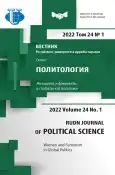“Fragile representation” or Women in Big Politics: The Case of the Administrative Elite
- Авторлар: Kolesnik N.V.1
-
Мекемелер:
- Sociological Institute of the RAS - Branch of the Federal Center of Theoretical and Applied Sociology of the Russian Academy of Sciences (SI RAS - FCTAS RAS)
- Шығарылым: Том 24, № 1 (2022): Women and Feminism in Global Politics
- Беттер: 107-119
- Бөлім: REGIONAL COOPERATION AND INTEGRATION
- URL: https://journal-vniispk.ru/2313-1438/article/view/322593
- DOI: https://doi.org/10.22363/2313-1438-2022-24-1-107-119
- ID: 322593
Дәйексөз келтіру
Толық мәтін
Аннотация
The research of the “feminization” of administrative politics is important to understand the transformation of power and the overall development of the Russian society amidst political, economic and social instability. This article presents the study results for the administrative elite in ten Russian regions (Moscow, St. Petersburg, Leningrad, Rostov, Kaliningrad, Kostroma and Novosibirsk Oblasts, Khabarovsk and Stavropol Krais, Republic of Dagestan). The analysis of the socio-demographic characteristics of the administrative elite showed no significant differences between men and women in terms of age, birthplace, as well as the type and the place where first (and subsequent) higher education was received. Studying the career trajectories of women in the ministerial elite showed that they most often occupy elite positions, like men, in middle age, but less often come from economic and security structures; horizontal and vertical movements mostly take place within the same professional institution - executive power agencies. The author identified regional governments with similar gender specifics (relative gender parity and relative gender imbalance). The study revealed that more feminized governments are formed in bordering and economically successful regions, while gender imbalance is most characteristic for the governments of economically dependent regions and those located in the south of the Russian Federation (with some exceptions).
Негізгі сөздер
Авторлар туралы
Natalya Kolesnik
Sociological Institute of the RAS - Branch of the Federal Center of Theoretical and Applied Sociology of the Russian Academy of Sciences (SI RAS - FCTAS RAS)
Хат алмасуға жауапты Автор.
Email: n.kolesnik@socinst.ru
ORCID iD: 0000-0003-2323-6799
PhD in Sociology, Senior Research Fellow
Saint Petersburg, Russian FederationӘдебиет тізімі
- Aivazova, S.G. (2012). Gender characteristics of the political behavior of russians in the context of the electoral cycle of the parliamentary and presidential elections of 2011–2012. Woman in Russian society, 3, 3–11. (In Russian).
- Albanesi, C., Zani, B., & Cicognani, E. (2012). Youth civic and political participation through the lens of gender: The Italian case. Human Affairs, 22(3), 360–374.
- Angapova, O.B. (2014). Classification of border regions of the Russian Federation. Bulletin of Buryat State University, 2, 76–80. (In Russian).
- Annesley, C., & Franceschet, S. (2015). Gender and the executive branch. Politics & Gender, 11, 613–617.
- Belyaeva, G.F. (2008). Political activity of women. Issues of state and municipal administration, 1, 143–164. (In Russian).
- Bernard, R., Davis, S.S., & Teele, D.L. (2021). To Emerge? Breadwinning, motherhood and women’s decisions to run for office. American Political Science Review, 115(2), 379–394.
- Bright, J., Doering, H., & Little, C. (2015). Ministerial importance and survival in government. Tough at the top? West European Politics, 38(3), 441–464.
- Chirikova, A.E., & Lapina, N.Yu. (2009). Woman on the highest floors of government. Russian practices and French experience. INAB, 3. M. Institute of Sociology, RAS. (In Russian).
- Costa Pinto, A., Cotta, M., & Tavares de Almeida, P. (Eds.). (2017). Technocratic ministers and political leadership in European democracies. London: Palgrave.
- Druckmann, J.N., & Warwick, P.V. (2005). The missing piece: measuring portfolio salience in western European democracies. European Journal of Political Research, 44(1), 7–42.
- Escobar-Lemmon, M., & Taylor-Robinson, M. (2005). Women ministers in Latin American government: when, where, and why? American Journal of Political Science, 49(4), 829–844.
- Khasbulatova, O.A. (2014). Gender approach as a technology to improve the effectiveness of personnel policy. Woman in Russian society, 4, 3–10. (In Russian).
- Kolesnik, N.V. (2021). Gender (not) equality in the political power of the Russian regions. Monitoring of public opinion: economic and social changes, 4, 468–491. (In Russian).
- Krook, M.L., & Mackay, F. (Eds.). (2011). Gender, politics and institutions: toward a feminist institutionalism Basingstoke: Palgrave.
- Krook, M.L., & O’Brien, D.Z. (2012). All the president’s men? The appointment of female cabinet ministers worldwide. Journal of Politics, 74(3), 840–855.
- Nikolaev, A.N. (1995). The formation of the technocratic elite in Russia: historical and sociological aspects. Saratov: Ed. center of the Saratov State Academy of Economics, 166 p. (In Russian).
- Ovcharova, O.G. (2007). Gender asymmetry in politics: the search for an institutional solution to the problem. Bulletin of the Saratov State Academy of Law, 5(57), 214–219. (In Russian).
- Popova, О.V. (2013). Gender aspects of the political career of the Russian subfederal elite: opinions of experts. Woman in Russian society, 3, 21–30. (In Russian).
- Tartakovskaya, I.N. (2015). Reproduction of gender order through career strategies: an attempt at intersectional analysis. Sociological research, 5, 84–93. (In Russian).
- Tartakovskaya, I.N. (2017). Femininity of precarity. Interaction. Interview. Interpretation, 14, 45–53. (In Russian).
- Verzichelli, L. (2018). Executive Elites. In H. Best & J. Higley (Eds.), The Palgrave Handbook of Political Elites (pp. 363–380). London: Palgrave Macmillan.
- Whitford, A., Wilkins V., & Ball, M.G. (2007). Descriptive representation and policymaking authority: evidence from women in cabinets and bureaucracies. Governance, 20(4), 559–580.
- Zadorin, I.V. (2018). Regions of the frontier: territorial identity and perception of “special”. Politics, 2(89), 102–136. (In Russian).
Қосымша файлдар









